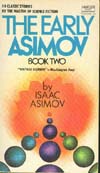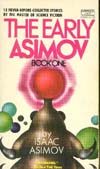Isaac Asimov sees things from a different perspective: Millions of miles removed!
THE EARLY ASIMOV, BOOK ONE is the first of a two-volume edition. These thirteen classic tales from the fantastic imagination of Isaac Asimov range from interplanetary collisions to Galactic Congresses, from Rigellian psychologists to Martian. The stories include:
- The Callistan Menace
- Ring Around the Sun
- Trends
- The Magnificent Possession
- History
- The Imaginary
- Half-Breed
- Homo Sol
- The Weapon Too Dreadful to Use
- Half-Breeds on Venus
- Heredity
- Black Friar of the Flame
- The Secret Sense
Here is a unique collection of Asimov’s early stories, written during the period now known as The Golden Age of Science Fiction. “Absolutely captivating.…Asimov was writing when science fiction was really the literature of ideas, and it is wonderful, intricate, informative ideas that he crams into these stories.…Damned enjoyable. Everyone who digs Asimov must get this book.”—AMAZING SCIENCE FICTION
14 Fantastic Stories by the Master of Science Fiction, Isaac Asimov
A GHOST SUES FOR THE LEGAL RIGHT TO HAUNT A HOUSE…a new world is discovered, inhabited by robots, and only by robots…and the author of the famous Reginald de Meister detective series finds he has a new rival in love—Reginald de Meister.
THE EARLY ASIMOV, BOOK TWO, is the second of a two-volume edition. These fourteen amusing and entertaining tales were written during the period now known as the Golden Age of Science Fiction; and along with the stories, Asimov has included a fascinating commentary on the stories, the times, and himself as a writer.
“Fascinating!”—The New York Times
“The imagination if constant, from the first—unmatchable! It’s a collector’s item for the science fiction fan.”—Pittsburgh Press
This book is vital to own on a number of levels.
The first is that it’s Asimov’s first “autobiographical” book. Now, Asimov had written a number of books with significant about-Asimov-himself content prior to The Early Asimov, but this is the first book where the main focus (frankly) is Asimov himself. While some of the information here is inaccurate, and there’s little included that isn’t in the later, formal autobiographies, it’s still an interesting story, told in an interesting way.
In particular, this book focuses on Asimov’s writing in a way that the other books don’t—because it contains it. We get a much better feel for the process Asimov went through as he transformed from a second-rate also-ran to a dominant figure in the field.
And have no doubt about it—most of the stories in this book are second-rate. After all, we’re dealing with the stories from the early part of Asimov’s career which didn’t get into any of his anthologies before 1972, and that (on the whole) means the early dregs. “The Callistan Menace,” “The Weapon Too Dreadful to Use,” “The Secret Sense,” “The Magnificent Possession,” and particularly the awful “Half-Breed” and “Half-Breeds on Venus” are painful to read. SF was a pulp field in the 1930’s and early 1940’s, and the field’s heritage shows in these early stories; some don’t rate very highly even by the comparatively low standards of the time (“Half-Breeds on Venus” is truly, truly awful).
The stories are not a total loss, however. Many are reasonably good, even if they have too much “pulp”—“Marooned off Vesta,” for example. Indeed, I’d place the notorious “Black Friar of the Flame” in this category. Asimov hated this story and considered it his worst among those he allowed to be anthologized, but it really isn’t all that bad.
And some are quite good, including Asimov’s first sale to Astounding (“Trends”), and the last few stories in the collection, particularly “The Red Queen’s Race” I’m also rather fond of “The Hazing” and “The Imaginary”
But wait! There’s more! I mentioned that this work is of primary interest as a literary autobiography, and it’s here that the stories become most valuable, because we get to see the origins of some of the hardware and ideas that became common in Asimov’s later work: blasters and neuronic whips, some of the planet names used in the Foundation books and, above all, psychology as a precise, mathematical science. The germs of the Foundation books are laid out here, for all to see.
On a number of levels, then, this is worthwhile: as a history of Asimov, as a history of his writing, as a history of the very field inasmuch as Campbell molded sf even while he molded Asimov. And, if nothing else, a number of the stories really are worth reading.
(And I’m particularly fond of it because Asimov himself told me to read it.)
Contents





